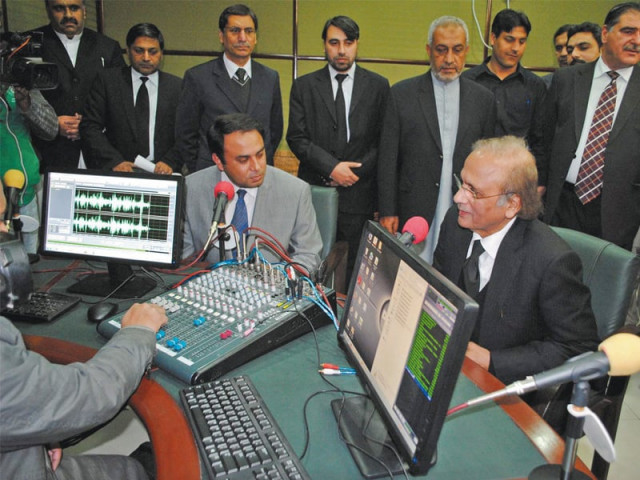Adjudication advice: Dispense justice without fear or favour, CJP tells judges
Inaugurates ‘E-citizen Grievance Redressal System’ at PHC’s Human Rights Directorate.

CJP Tassaduq Hussain Jillani addresses Radio Meezan during his visit to the Judicial Complex. PHOTO: PPI
Chief Justice of Pakistan (CJP) Justice Tassaduq Hussain Jillani said on Monday that while adjudicating on human rights and during suo motu hearings, some relief should be given to the complainant while there should be no compromise on the right to fair trial for the respondent.
“Fair trial is also a fundamental right and when taking up human rights and suo moto cases, we must keep in mind that in our passion to provide relief to complainants, we do not compromise the canons of fair trail and make observations that may stigmatise the respondent” Jillani told participants after inaugurating the ‘E-citizen Grievance Redressal System’ at the Human Rights Directorate of the Peshawar High Court (PHC).

The system, a first-of-its-kind in Pakistan, will allow aggrieved parties to file complaints to the directorate via email, SMS and telephone from any part of the province. PHC judges, registrar and other officials were present at the occasion.
Jillani urged PHC Chief Justice Dost Muhammad Khan to open a new wing at the directorate to deal with cases of overseas Pakistanis, as has been done in the Supreme Court recently, as they work hard and want to invest in the country.
“In a society afflicted with ethnic prejudices, sectarian tension and a stereotyped image of gender roles, judges being humans may also be vulnerable. They need to remind themselves they are under oath to dispense justice without fear or favour and are not to be influenced by such prejudices and social aberrations” Jillani told participants after inaugurating the Dost Muhammad Khan Mediation Centre at the Khyber-Pakhtunkhwa Judicial Academy.
While talking about the problems being faced by the country, the chief justice said Pakistan was confronted with poverty, unemployment, weak infrastructure, erosion of institutions and rural-urban migration, adding each organ of the state has to play its role to meet this challenge. He said the key, however, was delivering good governance.
“In a system of representative democracy and in the wake of a revolution of rising expectations, the judiciary is no longer a mere dispute resolution institution but also a socio-constitutional catalyst wherein it along with other institutions plays a pivotal role in shaping the life of citizens through the enforcement of rule of law” said Jillani.
He further said that the judicial system needs reforms and some of the fundamental elements of an effective judicial system would be equipping judges with the knowledge of law, procedure, judicial skills, integrity and professionalism.
“To ensure that dispensation of justice is not delayed, special courses have to be designed for case management so besides inexpensive justice, there is a qualitative improvement, and public confidence is restored in the institution,” the chief justice added.
Published in The Express Tribune, January 14th, 2014.













COMMENTS
Comments are moderated and generally will be posted if they are on-topic and not abusive.
For more information, please see our Comments FAQ